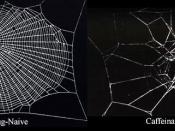I. INTRODUCTION
Caffeine is a popular drug that is consumed frequently by children. It is found in common foods like tea, cola and chocolate. Since the children are still growing and developing, the consumption of caffeine may negatively affect physical development.
II. DEFINITION OF THE PROBLEM
Does Caffeine affect the growth and development of mealworms?
III. LITERATURE REVIEW
About 85% of Americans consume caffeine in one form or another every single day. Caffeine is found in popular items such as coffee, tea, cola, and chocolate and it has been linked to depressing appetite (Weinberg and Bealer, xvi). Caffeine is America's most popular drug by far and the percentage of Americans that consume caffeine is more than all other drugs put together (Harris, 71). More than half of all American adults consume more than 300 milligrams (mg) of caffeine every day. Many people cannot go through a morning without a cup of coffee because caffeine is an addictive drug.
When caffeine was first discovered it was considered a medicine (Weinberg and Bealer, xii).
Caffeine is a chemical compound that is composed of the 4 most common elements, carbon, hydrogen, nitrogen, and oxygen. The formula for caffeine is, C8 H10 N4 O2, which means each caffeine molecule is made up of 8 carbon atoms, 10 hydrogen atoms, 4 nitrogen atoms, and 2 oxygen atoms (Weinberg and Bealer, 216). Caffeine crystallizes into long white, needlelike crystals (Wagner, 365). Pure caffeine is bitter and is highly toxic. It is a white powder that is soluble in boiling water. Caffeine is a central nervous system stimulant and an analeptic, a drug that restores strength to the body. After caffeine is ingested it is quickly absorbed into the bloodstream. The concentration of caffeine in the blood reaches its peak 30-60 minutes after it is ingested and...



Coherent
Your project is coherent and well stated. I especially like how you listed every material you need for the project. Thank You!
2 out of 2 people found this comment useful.